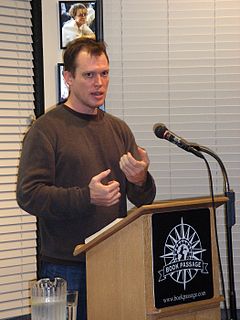Top 34 Quotes & Sayings by Rolf Potts
Explore popular quotes and sayings by an American writer Rolf Potts.
Last updated on April 16, 2025.
Travel compels you to discover your spiritual side by elimination: Without all the rituals, routines and possessions that give your life meaning at home, you're forced to look for meaning within yourself Indeed, if travel is a process that helps you 'find yourself', it's because it leaves you with nothing to hide behind - it yanks you out from the realm of rehearsed responses and dull comforts, and forces you into the present. Here, in the fleeting moment, you are left to improvise, to come to terms with your raw, true self.
The secret of adventure, then, is not to carefully seek it out but to travel in such a way that it finds you. To do this, you first need to overcome the protective habits of home and open yourself up to unpredictability. As you begin to practice this openness, you'll quickly discover adventure in the simple reality of a world that defies your expectations. More often than not, you'll discover that “adventure” is a decision after the fact-a way of deciphering an event or an experience that you can't quite explain.
Contrary to popular stereotypes, seeking simplicity doesn't require that you become a monk, a subsistence forager, or a wild-eyed revolutionary. Nor does it mean that you must unconditionally avoid the role of consumer. Rather, simplicity merely requires a bit of personal sacrifice: an adjustment of your habits and routines within consumer society itself.
In this way, we end up spending (as Thoreau put it) “the best part of one's life earning money in order to enjoy a questionable liberty during the least valuable part of it.” We'd love to drop all and explore the world outside, we tell ourselves, but the time never seems right. Thus, given an unlimited amount of choices, we make none. Settling into our lives, we get so obsessed with holding on to our domestic certainties that we forget why we desired them in the first place.
For some reason, we see long-term travel to faraway lands as a recurring dream or an exotic temptation, but not something that applies to the here and now. Instead — out of our insane duty to fear, fashion, and monthly payments on things we don't really need — we quarantine our travels to short, frenzied bursts.
Thus, the question of how and when to start vagabonding is not really a question at all. Vagabonding starts now. Even if the practical reality of travel is still months or years away, vagabonding begins the moment you stop making excuses, start saving money, and begin to look at maps with the narcotic tingle of possibility. From here, the reality of vagabonding comes into sharper focus as you adjust your worldview and begin to embrace the exhilarating uncertainty that true travel promises.
In a way, simplifying your life for vagabonding is easier than it sounds. This is because travel by its very nature demands simplicity. If you don't believe this, just go home and try stuffing everything you own into a backpack. This will never work, because no matter how meagerly you live at home, you can't match the scaled-down minimalism that travel requires.
Long-term travel isn’t about being a college student; it’s about being a student of daily life. Long-term travel isn’t an act of rebellion against society; it’s an act of common sense within society. Long-term travel doesn’t require a massive “bundle of cash”; it requires only that we walk through the world in a more deliberate way.






















